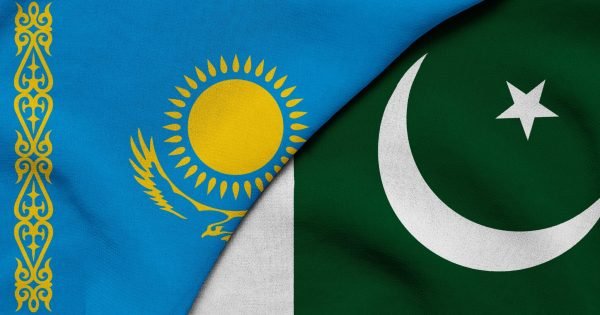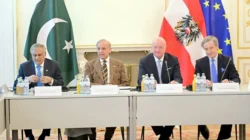Trade and Commerce Relations Rising Between Pakistan and Kazakhstan

21 November 2023
Published in: The Astana Times
In recent years, Central Asia has become a shining beacon of global collaboration, a nexus of alliances, and a thriving center for trade and commerce. Kazakhstan, among the Central Asian nations, is acclaimed as the financial and commercial heart of this dynamic region. Since declaring its independence in 1991, Kazakhstan has captivated global attention, attracting investments of a staggering $320 billion. This amount constitutes an impressive 60% of the total foreign direct investment (FDI) flowing into the Central Asian region.
Pakistan and Kazakhstan mutually benefit in numerous sectors, including trade, commerce, tourism, and culture. The warm waters of Pakistan’s Gwadar Port offer the most direct maritime route for Kazakhstan’s trade with vital regions such as the Middle East, Africa, and the Far East. Kazakhstan, with its abundant energy resources, is poised to fulfill Pakistan’s increasing energy needs.
Pakistan, as the fifth-largest market in the world with a vast population of 240 million, has the potential to import a diverse range of goods from Kazakhstan. These include construction materials, paint supplies, raw materials, food products, machinery, fertilizers, coal, and various metals. Conversely, Kazakhstan can import sought-after Pakistani goods, such as gemstones, fine jewelry, textiles, pharmaceuticals, agricultural commodities, fresh produce, footwear, leather items, as well as sports, medical, and construction equipment. The trade partnership between the two countries is laden with significant promise for future growth.
Indeed, Pakistan and Kazakhstan have made significant progress in bolstering their economic ties. The current trade volume between the two nations has soared to $138 million, yet this figure does not fully capture the potential of their trade relationship. Nauman Bashir Bhatti, Pakistan’s Ambassador to Kazakhstan, and Yerzhan Kistafin, Kazakhstan’s Ambassador to Pakistan, have crafted a roadmap with a determined goal: to boost bilateral trade to an impressive milestone of $1 billion. This target underscores their joint dedication to cultivating a richer economic alliance. Notable advancements are evident in the trade and commerce activities between Pakistan and Kazakhstan.
Since July 2023, a direct air corridor has been established between Pakistan and Kazakhstan. This significant development was inaugurated by Scat Airlines, which now conducts bi-weekly direct flights from Almaty to Lahore, scheduled every Tuesday and Friday. The convenience of direct flights is gaining popularity. According to the airline’s data, over three months of operation, 2,050 passengers (62% of the flight capacity), including business professionals, students, and tourists, have flown from Almaty to Lahore. In the reverse direction, 1,520 passengers (46% of the flight capacity) have traveled from Lahore to Almaty. Additionally, air cargo weighing up to 5,000 kilograms has been transported.
Following discussions with the National Logistic Corporation (NLC), Pakistan’s premier multimodal logistics enterprise, Kazakhstan has also recently dispatched several truck consignments on a novel trade route passing through Afghanistan to Pakistan. The ports of Gwadar and Karachi in Pakistan act as strategic conduits, linking Central Asia with the Middle East, South Asia, and Africa. The bilateral trade relations between Pakistan and Kazakhstan, both members of the Economic Cooperation Organization, encompass a variety of commerce sectors. The primary traded commodities include textiles, cotton yarn, rice, pharmaceutical products, oil and gas, minerals, and metals.
On the sidelines of the Belt and Road Forum, President Kassym-Jomart Tokayev met with the Prime Minister of Pakistan, Anwar-ul-Haq Kakar, to discuss issues and prospects for cooperation. Additionally, both countries have rekindled their sports interactions.
The golf federations of Pakistan and Kazakhstan have agreed to arrange reciprocal visits in the future. In July, a memorandum was signed between Alin Kanat, President of the Grappling Federation and founder of the Qazaq Batyry Martial Arts Academy, and the General Manager of SukhChain Wellness Club at the Kazakhstan House Lahore. The objective is to promote a healthy lifestyle and the development of martial arts in Pakistan.
There has been an increase in active collaboration in education and research between the two nations. In October, a meeting occurred between Gulzhan Argyn, Director of the Center for Trade and Economic Strategies, and the heads of the Policy Research Institute of Market Economy (PRIME), represented by Ali Salman, and the Pakistan Institute of Development Economics (PIDE), represented by Nadeem Ul Haque.
The historian and director of the Scientific Institute for the Study of the Ulus of Jochi, Professor Zhaksylyk Sabitov, visited Pakistan recently. He delivered lectures at universities and proposed joint research to investigate the shared historical ties and interactions between the peoples of the two regions, including ongoing research involving DNA testing. Two esteemed professors from Quaid-i-Azam University, Muazzam Ali Khan Khattak and Shujaul Mulk Khan, are currently visiting Pavlodar to give lectures to students at Pavlodar State University.
Both countries recognize the critical role of banking channels in fostering the growth of bilateral trade and commerce. The Astana International Finance Centre (AIFC) is collaborating with Nauman Bashir Bhatti, Pakistan’s Ambassador in Astana, to establish the AIFC Islamic Branch. Kazakhstan’s Ambassador in Islamabad has engaged with the Presidents of Askari Bank and Bank Alfalah to enhance financial sector cooperation between the two nations.
The inaugural meeting of the Kazakhstan-Pakistan Business Council took place in July. Discussions focused on activating overland and logistic routes, including the Trans-Afghan route and the Karakoram Highway.
The burgeoning trade and commerce ties between Pakistan and Kazakhstan are underpinned by their respective comparative advantages, historical connections, and the prospects offered by the Belt and Road Initiative. The forthcoming transit and trade agreement between Pakistan and Kazakhstan is anticipated to be instrumental in realizing the target bilateral trade volume of $1 billion.





